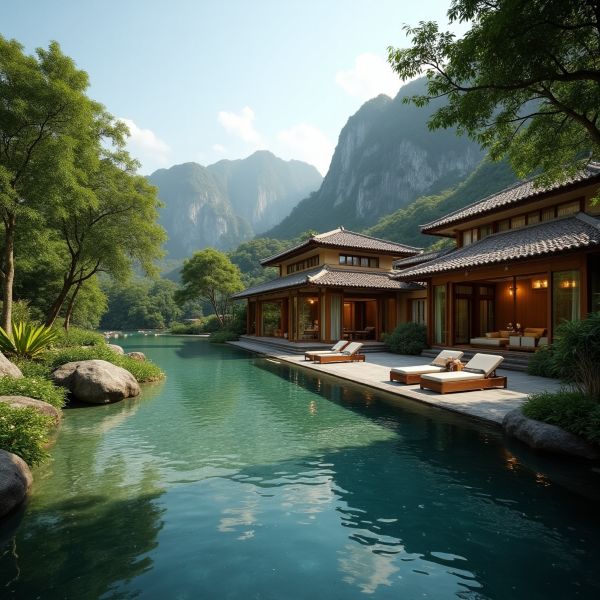Sunday, June 29, 2025
Wonsan-Kalma Beach Resort: North Korea’s Ambitious Leap into Tourism
Wonsan, located on North Korea’s eastern coast, has become the focal point of international attention with the recent unveiling of the Wonsan-Kalma beach resort. This sprawling, state-led development is now the country’s most expansive seaside complex, built to accommodate up to 20,000 guests. Spanning four kilometres of beachfront, it features a collection of high-rise hotels, water parks, retail outlets, and restaurants, all aimed at showcasing a new image of prosperity and hospitality.
A Grand Launch Along the Coast
The official launch took place on 24 June 2025, marking a significant moment in North Korea’s efforts to stimulate its economy through tourism. This project had long been in development, personally overseen by the nation’s leadership. The ribbon-cutting ceremony was described as a “proud first step” in transforming the country’s isolated tourism sector and was hailed as one of the year’s most significant achievements. The emphasis was not only on the facility’s scale but on what it symbolizes: an effort to position North Korea as a viable tourist destination despite global isolation.
Strengthening Alliances Amid Sanctions
The opening comes at a time when North Korea continues to face heavy sanctions from the West. However, this has not stopped the country from cultivating closer ties with Russia, a key player in its current tourism plan. Beginning 1 July 2025, the resort will open to domestic visitors, though access for international travelers remains uncertain. Notably, Russian nationals appear to be the first foreigners allowed limited access, with travel packages being promoted for around R30,000. This suggests a calculated step toward deepening bilateral engagement through tourism, even as other foreign nationals are kept at bay.
An Exclusive Retreat for the Elite
Early reports indicate that the resort’s initial guests will largely consist of North Korea’s domestic elite—party officials, military personnel, and those in high government positions. Given the country’s tight restrictions on internal movement, it’s unlikely that the average citizen will have access to the resort anytime soon. Western tourists are even less likely to be granted entry, not only due to political tensions but because of the regime’s strict control over ideological influence and foreign interaction.
Tourism as a Lifeline
Analysts suggest the resort is part of a larger strategy aimed at injecting foreign currency into a struggling economy, especially as North Korea seeks lawful means to generate revenue amid United Nations-imposed sanctions. Tourism remains one of the few industries where legal income can be pursued. However, there is precedent for caution—the Mount Kumgang tourism project with South Korea was abruptly terminated in 2008 after a fatal shooting, and that particular avenue has remained closed ever since. As such, expectations are high, but so are the uncertainties.
Luxury Amid Hardship
What makes Wonsan-Kalma particularly striking is the contrast between its polished façade and the daily realities faced by many North Koreans. As a lavish, tightly controlled resort rises along the coast, large parts of the country continue to endure food shortages, limited infrastructure, and economic stagnation. This dichotomy is seen by many observers as a public relations effort to project stability and growth, rather than a genuine transformation in living conditions.
A Destination for the Curious Few
For global travelers with an appetite for the unusual and politically complex, North Korea may hold a certain appeal. Wonsan-Kalma, shaped by strict governmental oversight and infused with state ideology, offers an unconventional travel experience. But rather than appealing to mass-market tourists, the resort may attract a niche audience seeking rare and geopolitically sensitive destinations.
Blending Image and Policy
The grand unveiling of the resort aligns with the country’s broader messaging around a “people-first” governance model. While maintaining a strong military posture, the leadership appears eager to present itself as invested in public welfare—at least for its privileged classes. The resort reflects an attempt to balance domestic luxury with external diplomacy, all within the framework of socialist civilisation ideals. This dual purpose reinforces the leadership’s desire to project both strength and benevolence.
Potential Influence on Regional Travel
Though visitors from South Africa, Europe, and North America are unlikely to experience the resort in the near future, the development could still have ripple effects. By opening its doors—even narrowly—North Korea is offering a controlled invitation to engage, at least with allied nations like Russia. If this venture proves successful, it may inspire other isolated nations to explore tourism as a path toward limited international interaction.
What It Means for the Travel Industry
For the travel sector, Wonsan-Kalma’s launch suggests a very specific, highly controlled opportunity.
The resort is not built for open tourism but serves a targeted purpose: showcasing the regime’s selective openness.Russian travel operators may see potential in this unique destination, offering exclusive, government-approved packages.However, widespread international appeal will likely remain out of reach, due to political tensions and tight regulation.
Looking Ahead
The coming months will be crucial for evaluating the resort’s effectiveness in drawing visitors and generating revenue. If the government can maintain safety, deliver on service, and appeal to its carefully chosen audiences, Wonsan-Kalma might open the door to future, albeit limited, tourism opportunities. Such success could even encourage similar projects in other nations with restricted access, carving a new path in the global tourism landscape.
Ultimately, Wonsan-Kalma represents both a gamble and a message—a gamble on tourism as a tool for economic and diplomatic gain, and a message that even amid sanctions and isolation, North Korea is eager to control how the world sees it.
«Enjoyed this post? Never miss out on future posts by following us»
